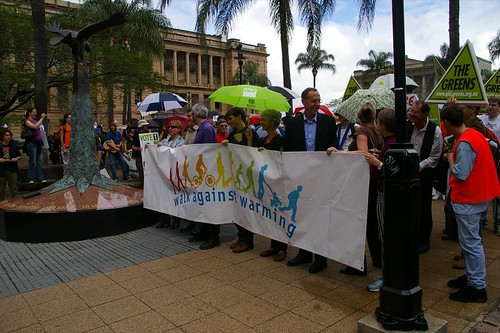Feb 3 2007
From The Record.
Michael M'Gonigle rolls into the University of Waterloo next week on an unprecedented wave of concern for the environment.
As a founder of Greenpeace International and a front-line environmentalist for more than 30 years, M'Gonigle is ecstatic to see the environment and climate-change as top-of-mind issues for Canadians.
But that's not enough, he says in a telephone interview from Victoria, where he practises law and teaches at the University of Victoria.
"My big concern is that there is a kind of issue-attention cycle, and it's really important that real leadership comes out of this and people seize the opportunity to do much more than just band-aid solutions," M'Gonigle says.
The environment has not been as big an issue since the acid-rain debates of the mid-1980s.
"The problem, though, is there is a correlation between how well the economy is doing and people's willingness to put the environment on top, but when the economy starts to slide, concern for the environment slides," M'Gonigle says.
"So it's a contradiction, a big contradiction. So being able to take advantage of this particular important window to start some pretty major re-thinking is a big challenge," M'Gonigle says.
During the past two months the environment has moved to the front burner in Canadian politics. Stephane Dion was elected Liberal leader in Montreal in early December, and the environment was the major theme of his leadership campaign.
Prime Minister Stephen Harper responded by appointing a new environment minister, and reinstating environmental programs his government had cancelled earlier.
While M'Gonigle is heartened by all this, he is far from satisfied.
"When you read the papers it's all talk, talk, talk, talk. Not solutions really. Not enough really thoughtful discussion of what do we have to do?" M'Gonigle says.
M'Gonigle has an extensive background in environmental activism.
He was co-founder of Greenpeace International in the mid-1970s. The group's work led to an international moratorium on commercial whaling. M'Gonigle was also a founding co-director of the Sierra Legal Defence Fund. While he was chair of Greenpeace Canada, M'Gonigle started the Greenpeace forest campaign in 1990.
These days he teaches political ecology and green legal theory at the Project on Ecological Governance at the University of Victoria, a program he recently founded. He has under-grad and graduate degrees in economics and law from the University of British Columbia, the London School of Economics, the University of Toronto and Yale.
When he comes to the University of Waterloo next week for a public lecture, M'Gonigle will draw heavily on a book he published last summer called Planet U: Sustaining the World, Reinventing the University.
All universities can play a much larger role in moving their local regions to more sustainable strategies in transportation, energy and planning, M'Gonigle says.
"The university can be a catalyst for local change. We haven't explored that nearly as much as we could," he says.
In March the University of Waterloo will hold a referendum on whether a bus pass for all students will be provided automatically. That would add $41 per semester to their student fees, plus an administrative fee tacked on by the students' union. All involved can expect a rebuke from M'Gonigle, who can't believe the issue is even up for a vote.
"Waterloo doesn't have a bus pass? Are you serious? Oh my God, that's good to know," he says. "They should have bus passes. They should have a sustainability office and a sustainability co-ordinator."
There is a continentwide movement for sustainable universities, and M'Gonigle holds up Yale as an example. M'Gonigle knows that school well, having earned two law degrees there -- a master's and a doctorate.
"Every university should have a vice-president of planning, innovation and sustainability. A vice-president who basically takes direction from the community and brings it into the university. That's the radical type of change I am talking about," M'Gonigle says.
Higher education is the most important industry on the planet, but it is also one of the most unaccountable.
The movement for a sustainable university intends to change that, he says.
Read the article.
Sunday, February 04, 2007
Greenpeace founder speaks about the environment becoming mainstream
Posted by
National Enquirer
at
10:56 am
![]()
Labels: environment, Greenpeace, Michael M'Gonigle
Subscribe to:
Post Comments (Atom)





No comments:
Post a Comment